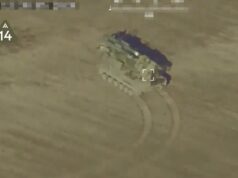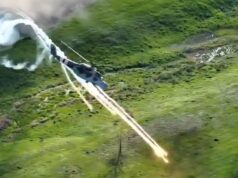British Army medics have been supporting trials of a new COVID-19 antigen test designed to give rapid results, say the Ministry of Defence.
It is understood that the test sees a swab taken from the back of throat, which is then smeared on to a chemical test strip that indicates within 20 minutes whether the person tested has Covid-19.
It is designed to provide rapid results to be used in public venues such as airports and theatres.
According to the aforementioned news release:
“Last week, some 90 medics supported Public Health England (PHE) trials of the test at secondary schools in Lewisham, Poole and Salisbury. The trial used pupils and staff not displaying symptoms to test the efficiency of mass use of the technology. One of the medics involved was Sergeant Louise Arthur from Colchester-based 16 Medical Regiment, who was working alongside PHE staff to carry out testing at Sedgehill School in Lewisham.”
Sergeant Arthur, a professional Army nurse, said:
“We were told on Tuesday lunchtime that we were supporting this work the next day, so we had to quickly get ourselves organised. On Wednesday morning the PHE staff walked and talked us through how to use the equipment and then we’ve just got on with it and been working together to test as many children and staff as we can.
The test a really quick and simple process – after we’ve checked paperwork and done the test, the person is in and out within two minutes – and everyone has been absolutely fine with it. As medics, it’s been interesting for us to be involved in developing a bit of cutting-edge science that, if it passes all the trials, will enable us to live alongside Covid-19 better and help us take a step towards normality.”
The Army’s involvement in this trial is the latest in a long list of task it has carried out in support of the government’s response to the COVID-19 pandemic.














I know there has been lots of research and candidates for saliva tests but it’s a shame nothing suitable (affordable, reliable and fast) seems to have come out of that yet. These fast swab tests are great for a test centre setting but if the ultimate aim is to roll something out widely for home testing as well I worry how poor swabbing technique by home users might affect the false-negative rate. At least this one sounds as if it is only throat, I’m really not sure how many home users would go through with a “ram it so far up your nose it feels as if it’s almost touching your eyeballs” swabbing procedure.
The army is playing a blinder. Remember the eucalyptus based insecticide spray they were using when they sorted out the PPE logistics? It was sent for evaluation to Porton Down and turns out to be very effective in stopping transmission of the virus.
https://www.biorxiv.org/content/10.1101/2020.09.25.309914v1
I’m just not seeing how all this work on rapid antigen testing is really worth it. we are diverting a lot of resources that we really need in meat and potato management of this virus and it’s impacts on what is quite frankly fairytales.
The truth is we are probably not going to be able to test and trace ourselves out of this disease, especially with antigen tests like this becuase
1) quite frankly they have rubbish sensitivity and specificity.
2) swabbing by inexperienced staff added massively to the error rates.
3) Even in hospitals with healthcare professionals undertaking the swapping we have found that there is a constant need for retraining as technique gets sloppy fast and this is with highly motivated well trained professionals.
4) impact on other point of care tests and the wider system….There is a limited production. And logistics for point of care tests and we are stretched already al out of tests use the same types of reagents ect…we are not ever going to be able to provide the levels of stuff needed to regularly undertake point of care testing at a population level. It’s the stuff of madness to think otherwise.
5) staff training pipe lines…..whose going to do all the training….. the health system is on its knees and is very quickly heading down from there.
6) who is going to pay….. this will not be cheap. Most of these types of test cost a not insignificant amount each, when you are taking a population of 70 million we could blow billions and not touch the side.
7) They are a snapshot on that day at that time…one person could need lots of these in a year… see point 6 blowing billions.
We have to start moving away from fantastic solutions and thinking in the long term sustainable ways of living with this disease. This is not a sprint pandemic like a flu, where you can flash a few billion at it and out last the disease. it’s a brand spanking new human corona virus with a natural R0 of around 3, that spreads via both respiratory and fecal oral routes and has a set of symptom that vary from none at all to death with what seem like a mortality rate of 1% and a nasty habit of debilitating people for a very long time.
The simple true is we must now figuring out how are we going to live with covid-19 for ever more, we need to start the long road of adapting our society so it will still function with the disease…. so what will our health system need to look like, will nursing and care homes be able to function as they did before, can we have the same level of mass gatherings or will they need to be a seasonal summer thing only, what will public transport look like etc.
We now need to start spending money to figure what our meat and potatoes ( every day of every year for ever) response will be and what this this will cost….look what the Victorians had to do to manage public health….we now need to do the same again.
An interesting summation! I agree that whatever happens with vaccines, we are going to have to make significant changes to our lives. The covid-19 revolution could well turn out to be more significant to people’s lives than the industrial revolution!
What is really interesting is this disease has really stress tested our society (and I’m taking the modern world not one county) around bio security and resilience. We have really been found wanting. We are so very use to being on top of managing waterborne diseases, bacterial diseases and the many childhood diseases that the human body creates a good immune response to that we never really thought what a problem a new respiratory disease that produces a poor immune response could really do to our society.
what’s really scary is that impact and impact because although from a societal risk this disease has weight of risk: 1% mortality 10% hospitalisation rate are scary numbers when you look at a population of 70 million (or 7 billion), the personal risk is low, less that .5% mortality rate for a middle aged person.
Now just look and and think, the most infectious disease on earth is Measles with an RO 14-18, mumps and chicken pox are not far behind with RO 10-12….now covid is popping along nicely with an RO of 3 ish… imaging covid with an RO 4-5 times higher ( viruses can do it), we would have an overwhelming level of infection before we could blink.
looking at case fatality rate Covid-19 is looking to be someplace between 0.4-1.0% ( so one in 100 who have the disease die of its… now take MERS another covid virus that has a case mortality rate of 60%. Lucky for the world it has a R0 of less than 1.
But what this tells is a story that Covid 19 is relatively easy as global kill pandemics go yet has had a massive impact on how our counties and the world works…..what would we do and how would our systems cope with a disease that has an R0 more like some of the most successful virus and yet has a case mortality rate that puts an individual at a real personal risk…say SARS with its CMR of around 10%…but let’s not even go to an R0 of measles…..in-fact would we still have a functioning society if SARS (SARS Cov 1)had turned out to have the same R0 as SARS Cov 2 ( Covid 19)……what will SARS Cov 3 bring….maybe just that.
There should be two words engraved on everyone’s mind after this year or two of trauma….Bio security matters more than almost anything.
Once we bury the few million dead over the next couple of years we will realise we were actually lucky ( as a species ) and the biggest ongoing risk from covid 19 is that we will have to adapt and live with it for a very long time indeed ( all our lifetimes at least) because human beings have a really short lived immune response to all the types of human covid virus in circulation ( we get the same ones every year) and Covid viruses are stable, not like a flu pandemic….here this year all mixed up in the general seasonal flu mix the next (different flu virus literally swap surface proteins and change with the turning of the season).
But when we all look back let’s hope the big lesson we learn is that it could easily have been a lot worse and we really don’t at present have a level of bio security to match the actual likely risks to our civilisation.
One interesting area of study in around the impact of bio security is around the reason there was only ever one stable civilisation in sub Sarahan Africa and that was in one place with a specific geographic feature that supported a defence against the darkness that has always haunted that continent ( sleeping sickness and malaria).